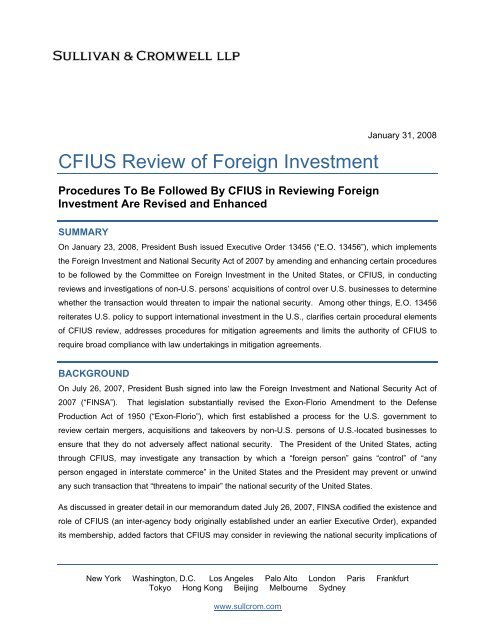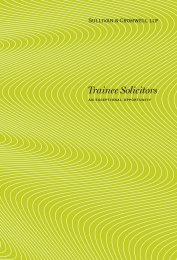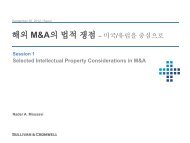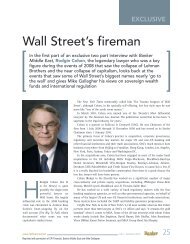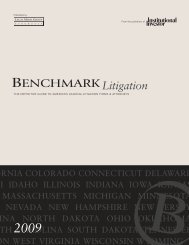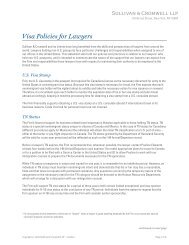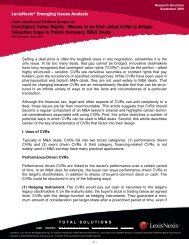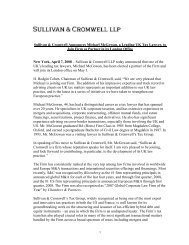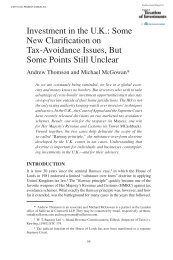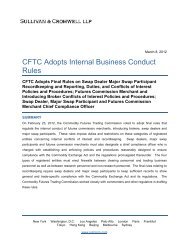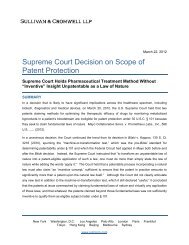Download Full PDF - Sullivan & Cromwell
Download Full PDF - Sullivan & Cromwell
Download Full PDF - Sullivan & Cromwell
Create successful ePaper yourself
Turn your PDF publications into a flip-book with our unique Google optimized e-Paper software.
CFIUS Review of Foreign Investment<br />
Procedures To Be Followed By CFIUS in Reviewing Foreign<br />
Investment Are Revised and Enhanced<br />
January 31, 2008<br />
SUMMARY<br />
On January 23, 2008, President Bush issued Executive Order 13456 (“E.O. 13456”), which implements<br />
the Foreign Investment and National Security Act of 2007 by amending and enhancing certain procedures<br />
to be followed by the Committee on Foreign Investment in the United States, or CFIUS, in conducting<br />
reviews and investigations of non-U.S. persons’ acquisitions of control over U.S. businesses to determine<br />
whether the transaction would threaten to impair the national security. Among other things, E.O. 13456<br />
reiterates U.S. policy to support international investment in the U.S., clarifies certain procedural elements<br />
of CFIUS review, addresses procedures for mitigation agreements and limits the authority of CFIUS to<br />
require broad compliance with law undertakings in mitigation agreements.<br />
BACKGROUND<br />
On July 26, 2007, President Bush signed into law the Foreign Investment and National Security Act of<br />
2007 (“FINSA”). That legislation substantially revised the Exon-Florio Amendment to the Defense<br />
Production Act of 1950 (“Exon-Florio”), which first established a process for the U.S. government to<br />
review certain mergers, acquisitions and takeovers by non-U.S. persons of U.S.-located businesses to<br />
ensure that they do not adversely affect national security. The President of the United States, acting<br />
through CFIUS, may investigate any transaction by which a “foreign person” gains “control” of “any<br />
person engaged in interstate commerce” in the United States and the President may prevent or unwind<br />
any such transaction that “threatens to impair” the national security of the United States.<br />
As discussed in greater detail in our memorandum dated July 26, 2007, FINSA codified the existence and<br />
role of CFIUS (an inter-agency body originally established under an earlier Executive Order), expanded<br />
its membership, added factors that CFIUS may consider in reviewing the national security implications of<br />
New York Washington, D.C. Los Angeles Palo Alto London Paris Frankfurt<br />
Tokyo Hong Kong Beijing Melbourne Sydney<br />
www.sullcrom.com
a transaction, and required heightened scrutiny of certain kinds of acquisitions, including those by “foreign<br />
government-controlled” entities and those involving U.S. “critical infrastructure.” FINSA also codified<br />
CFIUS’s practice of using “mitigation agreements” to resolve national security concerns raised by a<br />
transaction. CFIUS now has express authority to condition a transaction on the satisfaction of CFIUS’s<br />
national security concerns through a mitigation agreement or other condition. The statute requires that<br />
any such agreement or condition be based on a “risk-based analysis of the threat to national security”<br />
raised by the covered transaction. 1<br />
THE EXECUTIVE ORDER<br />
E.O. 13456 enhances and clarifies several matters of CFIUS-related policy and procedures. The<br />
principal provisions of E.O. 13456 are summarized below.<br />
U.S. POLICY FAVORS FOREIGN INVESTMENT<br />
Consistent with recent public statements by executive branch officials, in particular those in the Treasury<br />
Department, E.O. 13456 provides that “[i]t is the policy of the United States to support unequivocally<br />
[international] investment [in the United States], consistent with the protection of the national security”<br />
because such investment “promotes economic growth, productivity, competitiveness, and job creation.”<br />
The statement of policy in E.O. 13456 reaffirms that the value of such investment to the U.S. economy<br />
will be considered by CFIUS, along with national security considerations, in the course of any review that<br />
it performs.<br />
CFIUS COMPOSITION, LEADERSHIP AND ROLES<br />
Role and Authority of the Treasury Department<br />
FINSA established the Secretary of the Treasury as the chair of CFIUS, and E.O. 13456 further defines<br />
the Secretary’s role as chairperson. 2 Consistent with past practice, E.O. 13456 authorizes Treasury to<br />
act and communicate with parties to the transaction on behalf of CFIUS. It also delegates to Treasury the<br />
authority to issue the new Exon-Florio regulations required by FINSA, although Treasury must “consult”<br />
the other members of the Committee. 3 Treasury also is charged with coordinating the preparation of<br />
annual reports to Congress required by FINSA.<br />
1<br />
2<br />
3<br />
See our memorandum dated July 26, 2007, entitled “CFIUS Review of Foreign Investment: New Law<br />
Formalizes and Makes More Rigorous the National Security Review of Foreign Investment in the<br />
United States.”<br />
The Secretary of the Treasury may delegate his authority to other members of the Treasury<br />
Department; accordingly, we refer to “Treasury” rather than “the Secretary” in the text.<br />
These regulations must take effect no later than April 22, 2008.<br />
CFIUS Review of Foreign Investment<br />
January 31, 2008<br />
-2-
Role and Authority of the Lead Agency<br />
FINSA directs Treasury to designate, as appropriate, a “lead agency or agencies” in connection with<br />
review by CFIUS of each covered transaction. The lead agency, if so designated, is authorized to act on<br />
behalf of CFIUS with respect to the negotiation of mitigation agreements or other conditions that the<br />
Committee may determine to be necessary to protect national security, and to monitor and ensure<br />
compliance with any such agreements or conditions after the transaction closes. The Executive Order<br />
also clarifies that, if a lead agency is not designated in connection with any particular transaction, these<br />
powers remain with Treasury.<br />
As discussed below, under “Mitigation Agreements and Enforcement”, the lead agency’s discretion to act<br />
unilaterally is limited by E.O. 13456; among other things, the lead agency must inform the full Committee<br />
and secure its approval prior to negotiating a mitigation agreement, must keep the full Committee “fully<br />
informed of its activities” and must notify Treasury of “any material action” it proposes to take on the<br />
Committee’s behalf sufficiently in advance to allow adequate time for Treasury to consult the rest of the<br />
Committee and provide the Committee’s direction not to take, or to revise, such action.<br />
New CFIUS Members<br />
In addition to the heads of agencies designated as CFIUS members by FINSA, E.O. 13456 adds two new<br />
permanent members: the United States Trade Representative and the Director of the Office of Science<br />
and Technology Policy. Also added as observers, and as participants “when appropriate”, are the<br />
Director of the Office of Management and Budget, the Chairman of the Council of Economic Advisers,<br />
and the Assistants to the President for Homeland Security and Counterterrorism, National Security Affairs<br />
and Economic Policy.<br />
Additional Duties of the Commerce Department<br />
E.O. 13456 directs the Secretary of Commerce to obtain information about foreign investment in the<br />
United States, including trends and significant developments, and to analyze and report on that<br />
information, to the public as well as the President and other Executive Branch officials. The Commerce<br />
Department already collects information on foreign investment through its Bureau of Economic Analysis<br />
under the International Investment and Trade in Services Survey Act, 22 U.S.C. 3101 et seq. The extent<br />
to which the Commerce Department may need to or may wish to undertake additional efforts to comply<br />
with the directive in E.O. 13456 is not clear. Press reports on drafts of the Executive Order indicated that<br />
this role originally was intended to be fulfilled by the full Committee.<br />
NATIONAL SECURITY REVIEWS AND INVESTIGATIONS; REPORTING<br />
Briefly summarized, there are two stages to the CFIUS process. The first step is a national security<br />
review, which may be initiated either by the parties’ voluntary filing with CFIUS or, in the absence of such<br />
a filing, by the decision of the full Committee or of one of its member agencies. Once initiated, a review<br />
CFIUS Review of Foreign Investment<br />
January 31, 2008<br />
-3-
must be completed by CFIUS within 30 days. If, at the end of its review, CFIUS concludes that a<br />
transaction “threatens to impair” national security, it has 45 days to conduct a national security<br />
investigation. Transactions not opposed by CFIUS – historically, the overwhelming majority of foreign<br />
acquisitions – may proceed, and CFIUS will not later seek to re-open the transaction except in certain<br />
extraordinary circumstances provided by FINSA.<br />
National Security Inquiries By CFIUS Members<br />
E.O. 13456 appears to expand the authority of the individual member agencies of CFIUS by providing<br />
that any member may conduct its own inquiry with respect to the potential national security risk posed by<br />
a transaction. However, communications with the parties to the transaction must occur through, or in the<br />
presence of, the lead agency (or Treasury, if no lead agency has been designated).<br />
National Security Investigations<br />
FINSA requires CFIUS to conduct a national security investigation of certain covered transactions,<br />
particularly those that would result in foreign control of any “critical infrastructure” or that are by “foreign<br />
government-controlled” entities (subject, in each case, to certain conditions and exceptions). E.O. 13456<br />
adds to the list of transactions requiring a 45-day national security investigation any transaction that a<br />
single member of CFIUS believes “threatens to impair” national security.<br />
Reports to the President<br />
Under previously applicable procedures, reports were required to be sent to the President at the end of<br />
every national security investigation. E.O. 13456 provides that CFIUS shall report to the President, and<br />
request the President’s decision on a review or investigation of a transaction, in only three circumstances:<br />
(i) if the Committee recommends suspension or prohibition of a transaction; (ii) if the Committee is unable<br />
to make a recommendation; or (iii) if the Committee requests that the President make a determination<br />
with regard to the transaction. This appears to mean that reports to the President are no longer required<br />
at the conclusion of a national security review if CFIUS concludes that the transaction either does not<br />
present a national security risk or that such risk is mitigated by agreement or condition. (However, reports<br />
to Congress may be required by FINSA on such matters, as part of the effort to enhance Congressional<br />
oversight of the CFIUS process.)<br />
MITIGATION AGREEMENTS AND ENFORCEMENT<br />
Consistent with FINSA, E.O. 13456 authorizes CFIUS, or any lead agency, to seek a mitigation<br />
agreement or otherwise impose conditions on the parties to a transaction to address a national security<br />
risk found to be posed by a transaction if such risk is “not adequately addressed by other provisions of<br />
law.”<br />
CFIUS Review of Foreign Investment<br />
January 31, 2008<br />
-4-
E.O. 13456, however, sets out additional requirements limiting a lead agency’s discretion in this regard,<br />
presumably with the intent of helping to ensure that the full Committee gives careful consideration to any<br />
proposed mitigation agreement or condition. Prior to proposing a mitigation agreement to any of the<br />
parties to a transaction, the lead agency must first provide written notice to the full Committee identifying<br />
the specific national security risk that the transaction poses and setting forth the proposed mitigation<br />
measures believed to be reasonably necessary to address that risk. Only if the full Committee agrees<br />
that mitigation is appropriate and approves the proposed mitigation measures may the lead agency<br />
commence negotiating the agreement with the parties to the transaction.<br />
E.O. 13456 also addresses issues that may arise from overlapping jurisdiction and authority. E.O. 13456<br />
specifically preserves the authority of each CFIUS member to conduct inquiries, communicate with the<br />
parties, and negotiate, enter into, impose, or enforce contractual provisions with the parties to a<br />
transaction so long as these activities are conducted in the exercise of authorities other than those<br />
provided under Exon-Florio. At the same time, a CFIUS member may not condition its exercise of other<br />
authority it may have upon its exercise (or forbearance in the exercise) of its CFIUS-related authority.<br />
E.O. 13456 also provides that a mitigation agreement shall not, except in “extraordinary circumstances”,<br />
require a party to a transaction to recognize, state its intent to comply with, or consent to the exercise of<br />
any authority under existing provisions of law. 4 This provision appears to be intended to limit the<br />
potentially coercive power of CFIUS in certain respects. For example, one effect of this provision appears<br />
to be that, in the normal course, CFIUS will not be able to require a party to consent to the exercise of<br />
authority when it otherwise would not be bound, simply in order to have its transaction approved. Another<br />
effect appears to be that CFIUS is restrained, in the normal course, from including catch-all agreements<br />
to comply with applicable law, the breach of which could later be used to reopen consideration of a<br />
transaction, as Exon-Florio allows CFIUS to reopen consideration in the event of a material breach of a<br />
mitigation agreement. In a similar vein, E.O. 13456 expressly provides that CFIUS may not reopen a<br />
transaction that has previously been reviewed, except in the extraordinary circumstances identified by<br />
Exon-Florio, that is, where a party materially breaches its mitigation agreement or provides false or<br />
misleading, or omits, material information during the initial review.<br />
* * *<br />
Copyright © <strong>Sullivan</strong> & <strong>Cromwell</strong> LLP 2008<br />
4<br />
E.O. 13456 expressly provides that it does not impair or otherwise affect “existing mitigation<br />
agreements”; presumably, this means mitigation agreements entered into prior to January 23, 2008.<br />
CFIUS Review of Foreign Investment<br />
January 31, 2008<br />
-5-
ABOUT SULLIVAN & CROMWELL LLP<br />
<strong>Sullivan</strong> & <strong>Cromwell</strong> LLP is a global law firm that advises on major domestic and cross-border M&A,<br />
finance and corporate transactions, significant litigation and corporate investigations, and complex<br />
regulatory, tax and estate planning matters. Founded in 1879, <strong>Sullivan</strong> & <strong>Cromwell</strong> LLP has more than<br />
700 lawyers on four continents, with four offices in the U.S., including its headquarters in New York, three<br />
offices in Europe, two in Australia and three in Asia.<br />
CONTACTING SULLIVAN & CROMWELL LLP<br />
This publication is provided by <strong>Sullivan</strong> & <strong>Cromwell</strong> LLP as a service to clients and colleagues. The<br />
information contained in this publication should not be construed as legal advice. Questions regarding<br />
the matters discussed in this publication may be directed to any of our lawyers listed below, or to any<br />
other <strong>Sullivan</strong> & <strong>Cromwell</strong> LLP lawyer with whom you have consulted in the past on similar matters. If<br />
you have not received this publication directly from us, you may obtain a copy of any past or future<br />
related publications from Jennifer Rish (+1-212-558-3715; rishj@sullcrom.com) or Alison Alifano (+1-212-<br />
558-4896; alifanoa@sullcrom.com) in our New York office.<br />
CONTACTS<br />
New York<br />
H. Rodgin Cohen +1-212-558-3534 cohenhr@sullcrom.com<br />
Elizabeth T. Davy +1-212-558-7257 davye@sullcrom.com<br />
Joseph B. Frumkin +1-212-558-4101 frumkinj@sullcrom.com<br />
Washington, D.C.<br />
Eric J. Kadel, Jr. +1-202-956-7640 kadelej@sullcrom.com<br />
Margaret K. Pfeiffer +1-202-956-7540 pfeifferm@sullcrom.com<br />
Samuel R. Woodall III +1-202-956-7584 woodalls@sullcrom.com<br />
London<br />
Brian E. Hamilton +44-20-7959-8440 hamiltonb@sullcrom.com<br />
Richard C. Morrissey +44-20-7959-8520 morrisseyr@sullcrom.com<br />
Paris<br />
William D. Torchiana +33-1-7304-5890 torchianaw@sullcrom.com<br />
Hong Kong<br />
William Y. Chua +85-2-2826-8632 chuaw@sullcrom.com<br />
Michael G. DeSombre +85-2-2826-8696 desombrem@sullcrom.com<br />
Tokyo<br />
Stanley F. Farrar +81-3-3213-6172 farrars@sullcrom.com<br />
CFIUS Review of Foreign Investment<br />
January 31, 2008<br />
DC_LAN01:229388.4<br />
-6-


